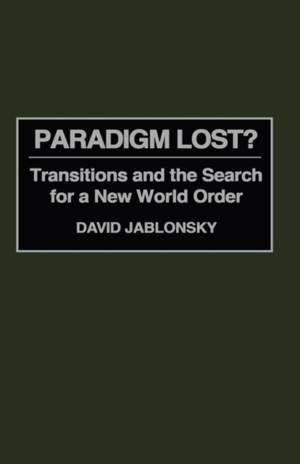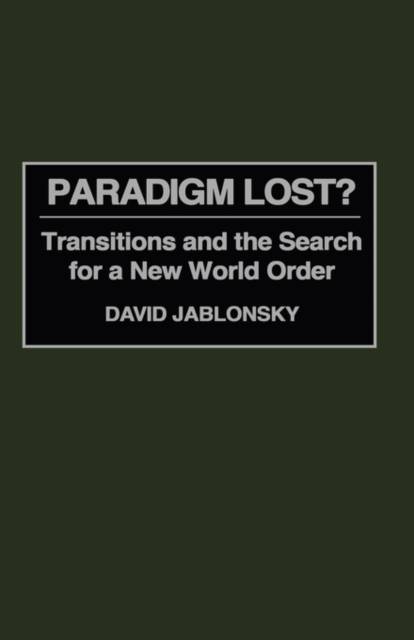
En raison d'une grêve chez bpost, votre commande pourrait être retardée. Vous avez besoin d’un livre rapidement ? Nos magasins vous accueillent à bras ouverts !
- Retrait gratuit dans votre magasin Club
- 7.000.000 titres dans notre catalogue
- Payer en toute sécurité
- Toujours un magasin près de chez vous
En raison de la grêve chez bpost, votre commande pourrait être retardée. Vous avez besoin d’un livre rapidement ? Nos magasins vous accueillent à bras ouverts !
- Retrait gratuit dans votre magasin Club
- 7.000.0000 titres dans notre catalogue
- Payer en toute sécurité
- Toujours un magasin près de chez vous
Paradigm Lost?
Transitions and the Search for a New World Order
David Jablonsky
Livre relié | Anglais
127,45 €
+ 254 points
Description
This book examines major historical post-war transition periods, with particular emphasis on the differences and similarities of the American experience after both world wars of this century and with the post-Cold War transition currently underway. Jablonsky provides a strategic vision that incorporates a multilateral, great-power approach to the international relations of our era.
After every momentous event there is usually a transition period in which participants in the events, whether individuals or nation-states, attempt to chart their way into an unfamiliar future. For the United States in this century there are three such transitions, each focused on America's role in the international arena. After World War I, the American people specifically rejected the global role for the United States implicit in Woodrow Wilson's strategic vision of collective security. In contrast to this return to normalcy, after World War II the United States moved inexorably toward international leadership in response to the Soviet threat. The result was an acceptance of George Kennan's strategic vision of containing the Soviet Union on the Eurasian landmass and the subsequent bipolar confrontation of the two super-powers in a twilight war that lasted for more than 40 years. Sometime in the penultimate decade of this century, the United States and its allies won the Cold War. Once again the United States faces a transitional period, and the primary questions revolve around the management of power and America's role in global politics. In this regard, the Cold War set in train a blend of integrative and disintegrative forces and trends that are adding to the complex tensions of the current transition. The realist paradigm still pertains in this situation where nation-states are still the primary international actors. In such a world, American government elites must convince an electorate, increasingly conscious of the domestic threats to national security, of the need to continue to exercise global leadership in the management of power. The answer, as Jablonsky demonstrates, is a strategic vision that incorporates a multilateral, great-power approach to international relations.Spécifications
Parties prenantes
- Auteur(s) :
- Editeur:
Contenu
- Nombre de pages :
- 144
- Langue:
- Anglais
Caractéristiques
- EAN:
- 9780275950330
- Date de parution :
- 24-03-95
- Format:
- Livre relié
- Format numérique:
- Genaaid
- Dimensions :
- 140 mm x 216 mm
- Poids :
- 331 g

Les avis
Nous publions uniquement les avis qui respectent les conditions requises. Consultez nos conditions pour les avis.






